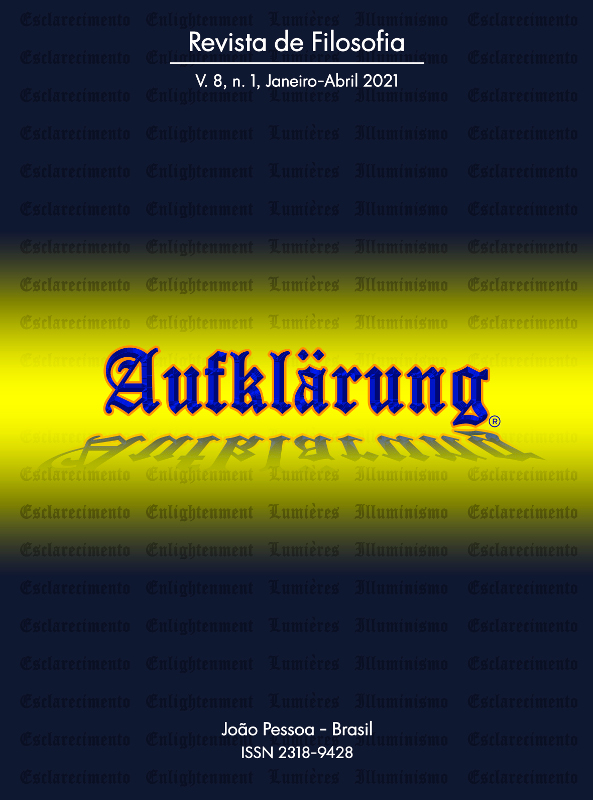Victoria pírrica: Fodor y la explicación científica de una psicología de sentido común
DOI:
https://doi.org/10.18012/arf.v8i1.57480Palavras-chave:
Creencias, inferencia, mecanismo, mente, realismo científicoResumo
Contra los molinos del holismo semántico y el neo-empirismo, el Quijote Fodor blande su lanza metafísica del realismo científico. El resultado es una victoria pírrica, puesto que, si bien logra dar una explicación plausible de los mecanismos mentales de fijación de creencias, su reivindicación de una psicología de sentido común debe recurrir al argumento circular de que las propiedades mentales son parte del orden del mundo. Su mérito, no obstante, es indiscutible: no se llega a la verdad científica por la vía de la neurofisiología, sino a través de nuestra cotidiana intencionalidad.
Downloads
Referências
ACERO, J. J. (2006). La Naturalización de La Intencionalidad. Episteme NS, 26(1), 1-40. Disponible en: <https://tinyurl.com/yxvp6vv8>. Acceso en: 26 de diciembre de 2020.
AGUINALDE, I. (2018). Problemas del materialismo en la filosofía de la mente. Seminario “Persona, mente y cerebro”. Instituto de Filosofía, Universidad Austral.
AGUIRRE, J. y JARAMILLO, L. (2013). Tesis de la carga teórica de la observación y constructivismo. Cinta Moebio, 47, 74-82. Disponible en: <https://tinyurl.com/y32d3cv4>. Acceso en: 20 de noviembre de 2020.
ANTONY, L. (2020). Not rational, but not brutely causal either: A response to Fodor on concept acquisition. Theoria, 35(1), 45-57. Doi: https://doi.org/10.1387/theoria.21031
ÁVILA, I. (2000). La modularidad de la mente y el relativismo epistemológico. Ideas y Valores, 49(112), 37-65. Disponible en: <https://tinyurl.com/y4v9zw24>. Acceso en: 02 de noviembre de 2020.
BRUNSTEINS, P. (2003). La psicología del sentido común después del materialismo eliminativista. Epistemología e Historia de la Ciencia, 9(9), 40-45. Disponible en: <https://tinyurl.com/y3cvfjz2>. Acceso en: 25 de octubre de 2020.
CASTILLO, S. (2018). Causalidad y emergencia. Crítica, 50(150), 27-41. Doi: 10.22201/iifs.18704905e.2018.14
CELA CONDE, C. y MARTY, G. (1991). El ciudadano Fodor no existe: Estructura y función en los procesos cognitivos. Psicothema, 3(1), 231-241. Disponible en: <https://tinyurl.com/y2w3bfod>. Acceso en 04 de enero de 2021.
CHOW, S. (2016). Fodor on global cognition and scientific inference. Philosophical Psychology, 29(2), 157-178. Doi: http://dx.doi.org/10.1080/09515089.2015.1013208
DIETRICH, E. (2001). Concepts: Fodor’s little semantic BBs of thought. A critical look at Fodor’s theory of concepts. Journal of Experimental & Theoretical Artificial Intelligence, 13(2), 89-94. Doi: 10.1080/09528130117948
ESCALONILLA, A. (2015). El origen del lenguaje desde la psicobiología contemporánea: Salto lingüístico o gradualismo [Tesis doctoral]. Universidad Complutense de Madrid.
FODOR, J. (1986). La modularidad de la mente. Madrid: Morata.
FODOR, J. (1994). Psicosemántica. Madrid: Tecnos.
FODOR, J. & PYLYSHYN, Z. (2014). Minds Without Meanings : An Essay on the Content of Concepts. Cambridge, Massachusetts: The MIT Press.
GARCÍA, O. (2009). Reflexiones en torno a la filosofía de la mente. Cultura, 23(23), 101-120. Disponible en: <https://tinyurl.com/y26yu9lv>. Acceso en: 10 de enero de 2021.
HERMIDA, P. (1993). La Psicosemántica de Jerry A. Fodor. Endoxa, Series Filosóficas (1), 359-372. Disponible en: <https://tinyurl.com/ycm8ft9h>. Acceso en: 14 de octubre de 2020.
KIM, J. (2014). El fisicalismo no reduccionista y su problema con la causalidad mental. Ideas y Valores, LXIII (155), 235-259. Doi: http://dx.doi.org/10.15446/ideasyvalores.v63n155.44762
MARGOLIS, E. & LAURENCE S. (2011). Learning Matters: The Role of Learning in Concept Acquisition. Mind & Language, 26(5), 507-539. Doi: 10.1111/j.1468-0017.2011.01429.x
McCARTHY, J. (1996). Concepts of Logical AI. Computer Science Department. Stanford University. Disponible en: <https://tinyurl.com/63gw3>. Acceso en: 20 de octubre de 2020.
MEDINA, N. (2010). Realidad mental en la ciencia cognitiva. Revista de Investigación en Psicología, 13(1), 209-220. Disponible en: <https://tinyurl.com/y3h6rtlh>. Acceso en: 12 de noviembre de 2020.
MORALES, J. (2013). Fodor y Kim en torno a la posibilidad de las ciencias especiales, la realizabilidad múltiple y el reduccionismo. Revista Colombiana de Filosofía de la Ciencia, 13(27), 63-84. Disponible en: <https://tinyurl.com/y2jxdvx3>. Acceso en: 16 de enero de 2021.
PADILLA-GÁLVEZ, J. (1992). Confirmación isotrópica-quineana reconsiderada. Taula, 15, 137-146. Disponible en: <https://tinyurl.com/y474fsxa>. Acceso en: 14 de octubre de 2020.
PEDACE, K. (2001). De la implausibilidad de los fisicalismos no reduccionistas. El monismo anómalo de D. Davidson y la teoría representacional de la mente de J. Fodor [Tesis de grado]. Universidad de Buenos Aires.
RELLIHAN, M. (2009). Fodor’s riddle of abduction. Philosophical Studies, 144(2), 313-338. Doi: 10.1007/s11098-008-9212-6
REY, G. (2018). Remembering Jerry Fodor and his work. Mind & Language, 33, 321-341. Doi: 10.1111/mila.12206
RODRÍGUEZ, M. (2006). Sobre conceptos. Atomismo Informacional. [Tesis de Magister]. Universidad de Chile.
SILENZI, M. I. (2015). ¿En qué consiste el problema de marco? Confluencias entre distintas interpretaciones. Eidos (22), 49-80. Doi: http://dx.doi.org/10.14482/eidos.22.6381
WAKEFIELD, J. (2003). Fodor on Inscrutability. Mind & Language, 18(5), 524-537. Doi: 10.1111/1468-0017.00241
Arquivos adicionais
Publicado
Como Citar
Edição
Seção
Licença

Este trabalho está licenciado sob uma licença Creative Commons Attribution 4.0 International License.
Política de Direito Autoral para os itens publicados pela Revista:
1.Esta revista é regida por uma Licença da Creative Commons aplicada a revistas eletrônicas. Esta licença pode ser lida no link a seguir: Creative Commons Attribution 4.0 International (CC BY 4.0).
2.Consonante a essa politica, a revista declara que os autores são os detentores do copyright de seus artigos sem restrição, e podem depositar o pós-print de seus artigos em qualquer repositório ou site.
Política de Direito de Uso dos Metadados para informações contidas nos itens do repositório
1. Qualquer pessoa e/ou empresa pode acessar os metadados dos itens publicados gratuitamente e a qulquer tempo.
2.Os metadados podem ser usados sem licença prévia em qualquer meio, mesmo comercialmente, desde que seja oferecido um link para o OAI Identifier ou para o artigo que ele desceve, sob os termos da licença CC BY aplicada à revista.
Os autores que têm seus trabalhos publicados concordam que com todas as declarações e normas da Revista e assumem inteira responsabilidade pelas informações prestadas e ideias veiculadas em seus artigos, em conformidade com a Política de Boas Práticas da Revista.






































